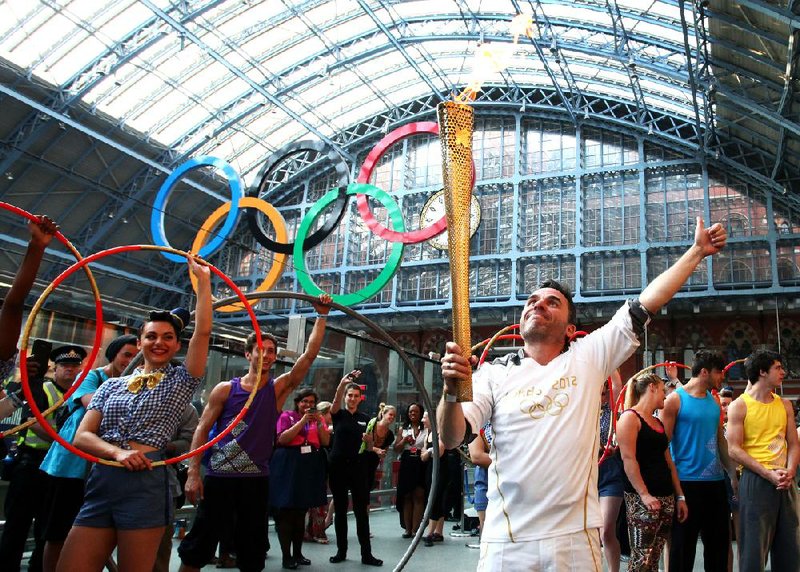LONDON — Security jitters were being felt across the British capital on the eve of the London Olympics, with the biggest mall in Europe briefly evacuated Thursday and noticeable security changes in place at Olympic Park.
Prime Minister David Cameron said, however, that he was confident the games, which Britain has worked to produce for years, will be successful and safe.
“You can never provide a 100 percent guarantee, but what I’ve seen, and what I’ve helped to coordinate, is, I think, a fully joined-up effort that involves one of the best armed services anywhere in the world,” Cameron said Thursday.
“I’m confident we can deliver on that, working with visiting delegations as well.”
A fire alarm Thursday afternoon forced authorities to briefly clear the Westfield shopping mall beside Olympic Park.
Hundreds of people flooded into the street, a day before tonight’s opening ceremony at nearby Olympic Stadium.
Police allowed shoppers to return after a few minutes. Westfield mall authorities said the alarm was triggered in a restaurant area.
Meanwhile, the Olympic torch took a festive, valedictory lap Thursday around London, taking in some of the sun-drenched capital’s most famous landmarks on the second-to-last day of its trek across Britain.
The torch — carried by athletes, charity workers and celebrities — thrilled thousands of Londoners as it swept across Regent’s Canal in Camden, through the city’s newly renovated neogothic train station at St. Pancras and down the winding streets of the ancient City of London.
For many Londoners, it was their first glimpse of a golden beacon that has spent the past 68 days traveling up and down the country, from Loch Ness to Land’s End, as well as going across the water to Ireland and Northern Ireland.
The torch completes its 70-day, 8,000-mile journey today, lighting Olympic Stadium’s cauldron in a ceremony marking the official start of the 2012 London games.
The identity of the final torchbearer is still a closely guarded secret.
Fears of terrorism have been at the center of preparations for the London Olympics, and authorities have twice been forced to deploy more troops in the past two weeks — first an extra 3,500, then another 1,200 — when security arrangements fell short.
Britain’s terror threat level is at substantial, which means a terror attack is a strong possibility.
It is a notch below severe, the level Britain has been at for most of time since the 2005 suicide bombings when 52 people were killed in morning rush-hour attacks on London trains and buses.
One British security official said there was no existing intelligence to indicate the threat level would change immediately.
Several terror suspects have been arrested in the past month but none has been accused of plotting directly against the games. He spoke on condition of anonymity because he was not authorized to speak to the media.
Dozens of FBI agents and other U.S. personnel are helping their British counterparts secure the games.
At some Olympic Park security entrances Thursday there was a noticeable shift from having military personnel man the airportlike security machines to having civilian security guards.
At one entrance, an Associated Press reporter put his bags through security, but the scanning machine that checks Olympic credentials was broken and the staff waved him through.
The G4S security firm, responsible for the bulk of Olympic security, said Thursday that it was getting hundreds more workers each day and hoped to replace some military personnel.
Company spokesman Adam Mynott said many new workers had passed the accreditation process or completed training.
The hope, he said, is to numerically replace the extra military personnel.
The security firm was lambasted earlier this month by the government for failing to provide enough personnel for the games.
Mynott said he would look into why the AP reporter’s credential wasn’t scanned but said the changes Thursday were routine station changes between civilian and military guards.
Cameron has promised to go after G4S if the company doesn’t fulfill its contract and to make sure it helps pay for the cost of the additional military personnel.
The firm expects to lose $54 million to $78 million on its Olympic contract, equal to about 12 percent of its annual profit.
Still, London residents and some visitors were on edge.
“It’s sunny and I think a lot of people are really excited about the Olympics but there’s also this sense of dread that something will happen,” said Tally Winfield, a 25-year-old London bartender.
One American tourist said the extra security seemed a tad daunting.
“With the police all around and troops, you definitely feel like something could happen at any time,” said Melissa Johnson, 36, of Los Angeles. “I’m not sure if I feel safer or just more worried. Then again, at least there are fewer guns here, right?”
Information for this article was contributed by Raphael Satter and Sheila Norman-Culp of The Associated Press.
Front Section, Pages 8 on 07/27/2012
